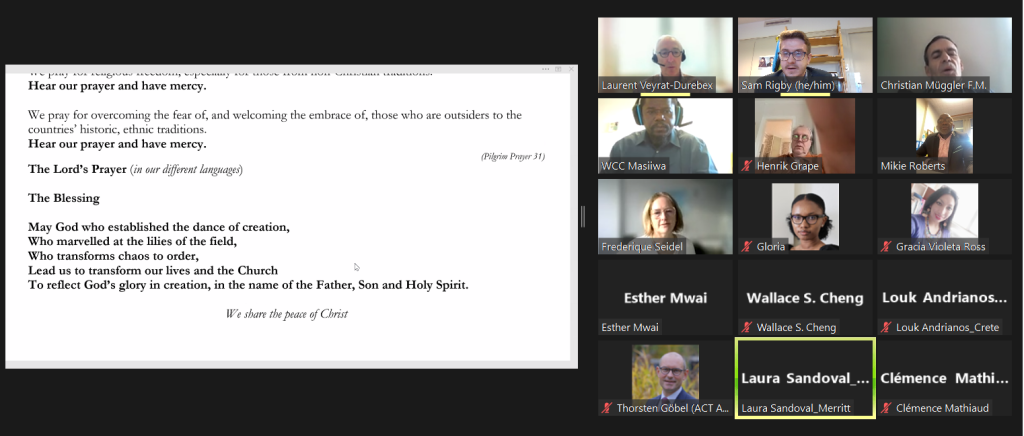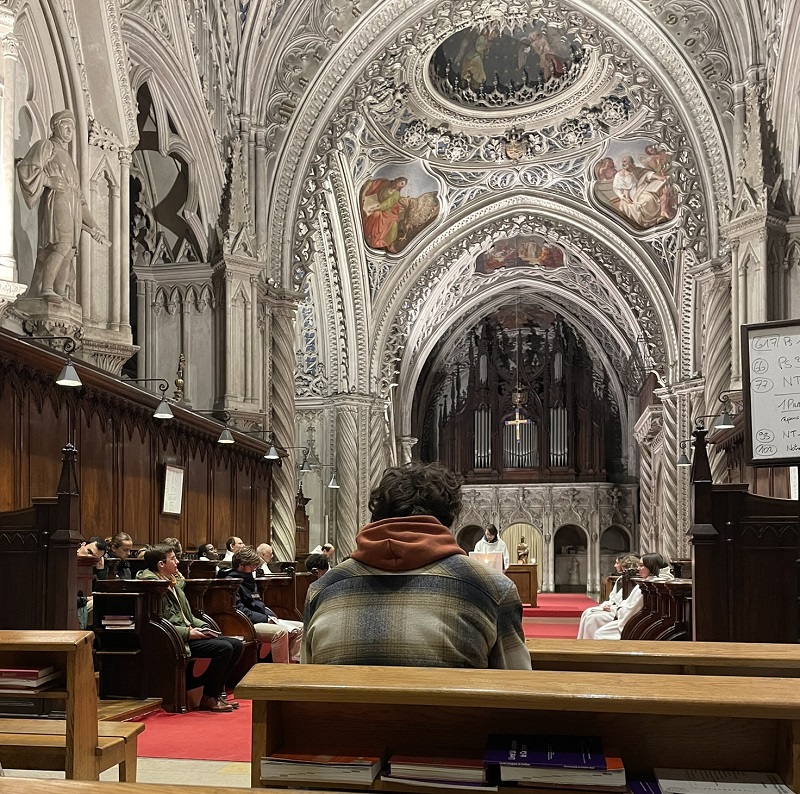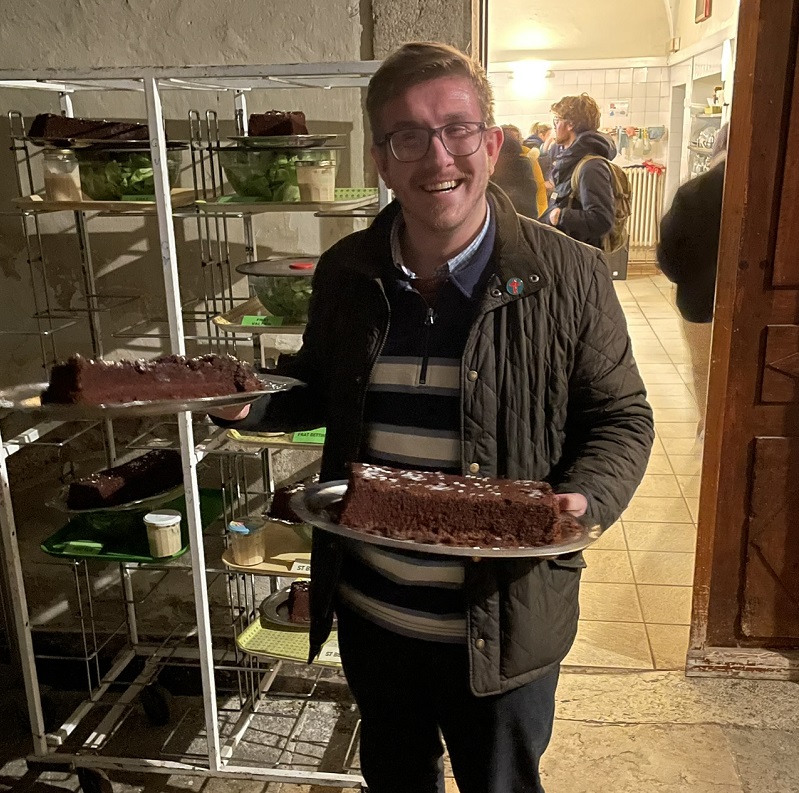Between Thursday 15 and Saturday 24 February 2024 I visited the World Council of Churches in Geneva and the Chemin Neuf Community at Hautecombe Abbey, France. My hope for this visit is that it would offer me a broader perspective on ecumenism on a global scale and complement my current studies at Emmanuel Theological College looking at Missional Theology in a Global Context.
My programme for the two days I was at the WCC was packed full of meetings and opportunities to discuss various areas of ecumenism…
In my meeting with Dr Andrej Jeftic, I learned about the WCC’s Faith and Order Commission and its current work on working for the visible unity of the church and preparing for the commemorations of the 1700th anniversary of the first Ecumenical Council of Nicaea.
I had a meeting with Rev Dr Kuzipa Nalwamba and was introduced to the history of the ecumenical movement, which the WCC uses a river and tributaries model to depict (pictured below), starting at the Edinburgh World Mission Conference in 1910 and flowing through to the present day.

On the following day I was invited to lead the WCC’s online Morning Prayer service. These daily times of prayer are always inter-confessional and draw on liturgical materials from the WCC’s Ecumenical Prayer Cycle, which throughout the year prays each week for the churches of a different group of countries. The week I was there we were praying for the churches of Austria, Liechtenstein and Switzerland. The service was mainly in English, other than the bible reading which was in French and everyone was invited at the end of the service to unmute their microphones to pray the Lord’s Prayer in their own language. This led to a holy cacophony of different voices praying the prayer that unites Christians of all denominations across the world.

Next, I met with Rev Dr Mikie A. Roberts, the Programme Executive for Spiritual Life and Faith and Order, and learned about his work on Spiritual Life and both the joys and difficulties of ecumenical prayer and worship. He described how ‘worship’ can be a problematic word, with denominations having different understandings of what that entails, whereas inter-confessional prayer gives greater flexibility and includes all member churches.
I then met with Dr Massiwa Ragies Gunda, the WCC’s programme executive on overcoming racism, xenophobia and related discrimination. Followed by some time with the WCC’s archivist, Anne-Emmanuelle, who showed me the more than 3000 metres of shelves with files and archive boxes. It was fascinating to see the history of the ecumenical movement represented by the sheer quantity of publications it has issued, all seeking to bring about the greater visible unity of Christians the world over.
From Geneva and the World Council of Churches, I travelled across the border into France to the Hautecombe Discipleship School (HDS), which is made up of young adults living alongside the brothers and sisters of the Chemin Neuf community and engaging in a gap year of theological learning and Christian service.
During my time there, I joined in the work of the community in the wood store and by baking banana bread and cakes for everyone. I participated in their worship. And spent time reading and reflecting on the ways in which charismatic and catholic spirituality combine in worship, which is the focus of the independent learning project I am currently undertaking in my final year of study at Emmanuel College.


It was a privilege to attend the weekly ‘Groupe de Priere’ or ‘Soirée de Louange’. This is a particular expression of the charismatic spirituality of Chemin Neuf, with extended times of sung contemporary worship, extempore prayer, sharing verses of scripture and prophetic words and images. It was a powerful experience to see the community utterly surrender to God in worship, just as they would at Adoration of the Blessed Sacrament. This time however was with hands raised and singing and praying in tongues. It is a true example of how charismatic worship practices can be just as powerfully and authentically expressed in a Catholic setting.
The ecumenical vocation of the community is demonstrated at Mass which is celebrated each day at noon. I discovered that the community at Hautecombe has been given special dispensation by their Archbishop to allow any Christian who believes in the Real Presence of Christ in the Eucharist (no further stipulation given) to receive the sacrament if they discern that it is right for them. This is in recognition of the distinctly ecumenical work that Chemin Neuf seeks to live out. This was quite a jaw-dropping revelation for me, having always before been prohibited from receiving communion in catholic churches, despite my professed belief in the Real Presence as an Anglo-Catholic Anglican. My immediate reaction was “why can’t this be modelled everywhere?!”, as something which is a clear sign of hope for the unity of the Church.
I am quite sad to be leaving Hautecombe but will take back with me so many good memories of seeing how God is at work in this wonderful community. Chemin Neuf is clearly a force for good in the church, with a real passion for seeing more unity between Christians, visible in every time of prayer, and seeing lives and the world transformed and renewed by the power of the Holy Spirit. God is doing something very special here at Hautecombe and I believe there is a lot the wider church can learn from their commitment to ecumenism.
Download Sam’s full diary report (pdf document).
Find out more about The Bill Snelson Young Ecumenists Fund. If you’re 18 to 35 years old and are from one of CTE’s national Member Churches you can apply for a grant to fund an ecumenical experience abroad.